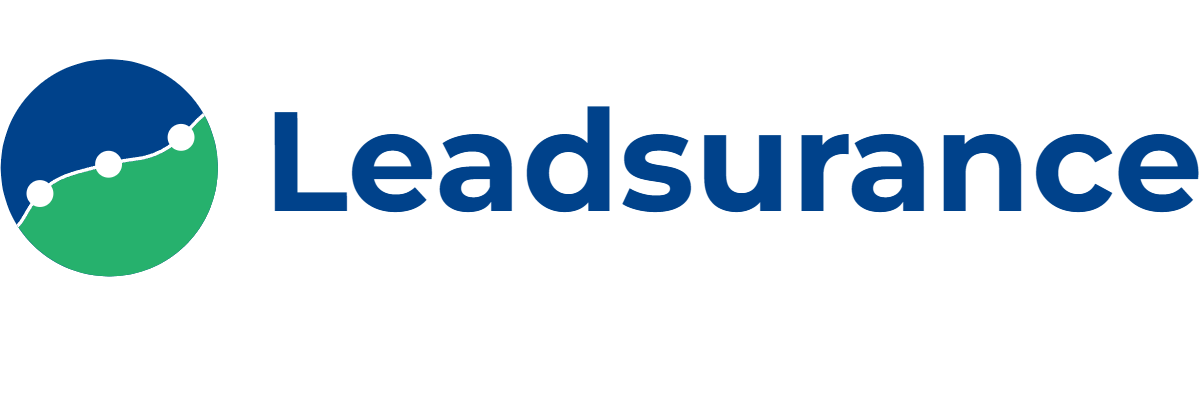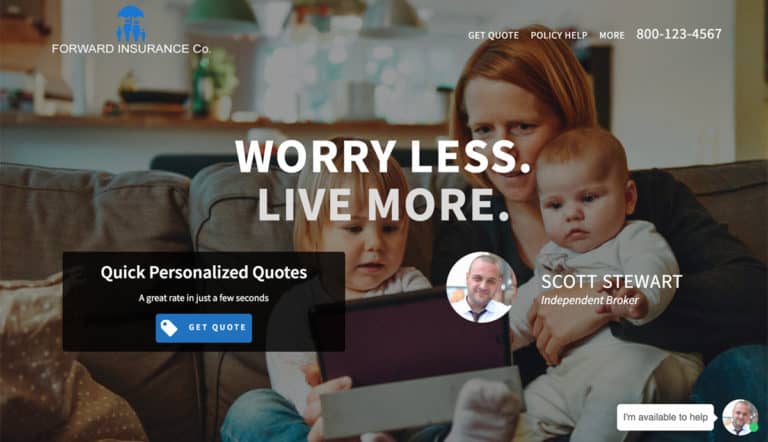Insurance is a very hands-on industry. Agents and brokers have, for the longest time, preferred face to face meetings with clients.
However, modern technology has encouraged the industry to adopt an online presence over the last decade or so, and the current global health crisis with COVID-19 has only pushed this trend further.
Now, insurance agents perform much of their work online via advertising and digital marketing, online training programs, CRM and lead management applications, quoting software systems, and phone transactions.
In today’s article, we will share some advice for selling insurance from home since many agents will be working from home in 2021.
Selling Insurance From Home in a Global Pandemic
Many businesses have closed their physical locations and have asked their employees to work from home. Insurance companies and private firms have also faced the same problem.
How can you make sales without meeting clients?
The technology for online transactions could not have come at a better time. Coronavirus has confined many people to their homes and yet, the insurance business is still booming and selling insurance from home is still quite plausible.

According to Flexjobs.com, research has shown that working remotely is good for businesses. 85% of surveyed businesses reported an increase in productivity while 90% of employees reported an increase in morale.
However, we understand that it is not easy to know how to get started. So, we took the liberty to create a detailed guide on selling insurance from home.
How to Successfully Start a Home-based Insurance Agency
A successful home insurance business needs licensing, the right tools, and resources.
Although you can find many insurance jobs working from home you can also consider the following process for starting your own insurance agency to sell insurance from home.
What Are Your Options?
First, you must decide on the type of insurance sales that are compatible with your personal and professional strengths.
Common insurance categories include:
- Auto insurance
- Home and property insurance
- General insurance
- Liability insurance
- Disaster insurance
- Life insurance
- Health insurance
- Disability insurance
Once you find a broad category, you can even specialize in a specific type of policy or plan to start out. This is called finding a niche and can help position you as an expert in your specific area.
You can market yourself in a very targeted manner, by selling a specific type of insurance to a specific market. Some examples could be selling disability insurance for doctors or commercial vehicle insurance for business owners.
As another example, if you choose to market health insurance, consider if any of the following health insurance categories suit your marketing style first.
Here are some health insurance niches you could focus your targeted marketing efforts on:
- Medicare packages
- Senior benefits plans
- Family plans
- Individual plans
- Secondary/ancillary insurance
When you play to your strengths and choose a specialty to focus on, you will stand out in the market. The narrower your focus, the less competition you’ll find in the beginning.
Once you feel comfortable with one type of plan though, you can begin to add more options to diversify your skillset and offerings to build a larger clientele. Eventually, you may find yourself selling many types of insurance.
Determine the Background Requirements
If you were already selling insurance in a brick and mortar office, the transition to selling from home is simply a change of venue.
On the other hand, if this is your first-time selling insurance, you must meet the following requirements to become a licensed insurance agent:
- Education/certification
- Testing
- Licensing
- Background checks
The pre-licensing education required by most states can usually be done online. Insurance courses generally cover relevant laws, regulations, and ethics.
You must pass the exams for the license to sell insurance to be issued. States will likely conduct a background check before the license is issued.
Remember if you plan to work from home it would be wise to invest in a proven insurance agent training program to help you continue to improve your skills and grow your agency.
Logistics of the Home Office
After you are licensed to sell insurance, let’s talk about your home office.
You will need equipment and tools to set up an efficient workplace from home. The office space you choose should be isolated from background noise.
The following resources will help you run an efficient home office:
- High-speed internet and/or mobile hotspots (5G is ideal)
- Secure digital storage (cloud-based or local)
- Video conferencing software
- Scheduling apps to handle your to-do lists
- Office furniture
High-speed internet will aid your research, video calls, and support tasks. These are all important aspects that require a reliable internet connection. You don’t want to lose customers because your internet fails.
Mobile hotspots are great to use as back-ups in case your WI-FI connection is interrupted. When this happens, you simply have to switch to a different channel and your work continues uninterrupted. It is a worthy investment.
Any kind of secure digital storage will do so long as it can handle numerous files from multiple clients, plus your business files, and so on. However, cloud storage is both efficient and secure for storing such large data safely and allows you to access your files from virtually anywhere.
Even though you are working from home, you will still be meeting virtually with your co-workers and clients. There are a number of different video conferencing apps available specifically for this purpose. Tip: use the apps you expect your clients to enjoy most.
Scheduling apps keep track of your to-do lists. Use them to organize the daily tasks that you are required to handle. They have alerts and notifications to remind you in case you are forgetting something.
Stay Organized
You will be managing multiple clients, prospects, as well as insurance carriers so “paperwork” is inevitable. Organize your physical files using file cabinets and keep your digital files well organized as well.
Insurance files sometimes contain sensitive information that needs to be secured. In this instance, consider getting a lockable drawer following the HIPAA privacy and security regulations.
Again, digital files also need to be organized for easy access and efficiency. Software such as customer relationship management (CRM) software is an excellent place to start.
CRM software is designed to organize client data and reduce the amount of paperwork generated. The following essential information can be cataloged on the software.
Basic CRM contact fields:
- Names
- Pre-existing health conditions
- Policy renewal dates
- Private financial and identifying information
- Dependents
Add a Personal Touch to Your Marketing Efforts
Get an edge over your competitors by making your customers feel seen. Dedicate some of your time to making personalized messages for your clients.
It is not a terrible idea to go a step further and create time for video calls to create rapport with your current clients.
You will definitely want to manage your leads properly with best practices for cold calling as well as using personalized email marketing campaigns.
Create an Online Presence
More people are online now than ever before and businesses are taking advantage of this fact.
You can save money by building a DIY website using an insurance website builder. However, this should only be a short term strategy. As soon as possible you should have a professional create your web presence.
Hire a web designer to create a user-friendly and attractive website for your insurance agency. Update this website with the latest information about insurance and other traffic-generating news.
Here are some insurance blogging tips to help you drive traffic to your new website.
Create social media accounts and use them to engage and interact with potential clients.
Set up profiles on Facebook, Google and Yellow pages and request online reviews from your clients.
Your online presence gives people confidence in your services, in addition to generating leads that translate into sales.
The Benefits of Selling Insurance from Home
The transition to a home office is natural, especially for agents endowed with solid entrepreneurial and organizational skills. By employing these two personal strengths, you will enjoy the independence of working from home.
One of the best-selling points of the argument for working from home as an independent agent is the autonomy to determine your own working hours. Though, keep in mind that your availability also affects how well your business does.
The benefits you reap directly correspond to the amount of effort you put in. If you become an agent for the impact you can create in people’s lives, then selling insurance will prove lucrative and fulfilling.
So, what benefits will you gain from selling insurance at home? While there is a lot to gain from working at home, here are some of the most popular ones:
- A higher earning potential — The traditional office setting comes with a limit on the number of hours that you can work. It also has a lot of distractions and diversions. At home offices, there are no time constraints, and distractions can be eliminated (with discipline).
With fewer distractions and time constraints, there is a higher earning potential for home-based insurance agents. Research shows that the average salary for stay-at-home workers is at least $4000 more than that of office workers.
All it takes for you to get better earnings from home is motivation. If you have the drive, you can restructure your day and earn more money.
- Lower operational costs — When you are working from home you eliminate transportation costs, like fuel expenses. Working from home can also reduce the amount you spend on buying meals and hiring a babysitter. These subtle changes can represent huge savings!
- Freedom — The freedom to set your own working hours is unparalleled. This fact accommodates both the early risers and the night owls. In a nutshell, you have the freedom to work at the times that you are most productive.
- Family is everything — Working from home means more family time. Your loved ones will literally be in the next room. You will have a lot of time to see and connect with them.
- Minimal commutes — Driving to and from the office can be draining. Commuting on public transport is equally tasking. A lengthy commute is a reason that some employees have quit their jobs. Staying home eliminates both problems and presents the opportunity to remain productive longer.
Whatever the motivation fuels your drive to work from home as an insurance agent, nurture it. These benefits we have listed tend to be enjoyed by the most dedicated workers.
Conclusion
Circumstances may have forced insurance agents to work from home, furthermore, some situations naturally demand remote interaction.
Heck, maybe you just bought a new home and it came with a really nice home office that you want to start using. Just make sure to check it for construction defects first, learn more about this.
Regardless of why you start selling insurance from home, even after COVID-19, many agents will still continue working from home, performing at least some of their work tasks remotely.
The bottom line is that selling insurance from home is the new normal.
There is little to lose from selling insurance remotely as the costs are low however it will take effort to learn and create new remote processes.
Hopefully, this article shared some helpful information to get you started on selling insurance from home.






